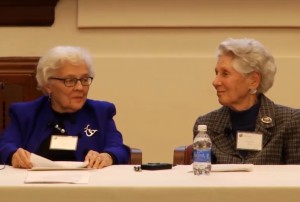Announcing the 2019-2020 Women in Medicine Legacy Foundation Fellow
The Archives for Women in Medicine and Women in Medicine Legacy Foundation are pleased to announce the 2019-2020 Foundation for the History of Women in Medicine Fellow: Heather Munro Prescott, Ph.D.

Heather Munro Prescott, Ph.D. 2019-2020 Women in Medicine Legacy Foundation Fellow
Heather Munro Prescott is Professor of History at Central Connecticut State University in New Britain. She specializes in the history of women in medicine and women’s health issues with an emphasis on the post-World War II era. Her first book, A Doctor of Their Own: The History of Adolescent Medicine, which drew on archival materials in the Countway Library and Boston Children’s Hospital, received the Will Solimene Award of Excellence in Medical Communication from the New England Chapter, American Medical Writers Association. Her most recent book is The Morning After: A History of Emergency Contraception, published by Rutgers University Press in 2011. She has also published articles on the history of medicine in the Bulletin of the History of Medicine, Journal of the History of Medicine and Allied Sciences, and Technology and Culture. She has also received numerous grants and awards, including the American College of Obstetricians and Gynecologists Fellowship in the History of American Obstetrics and Gynecology, a National Endowment for the Humanities Fellowship, and publication grants from the National Library of Medicine. Her Women in Medicine Legacy Foundation Fellowship will be used to conduct archival research for a book on the cultural history of Planned Parenthood Federation of America.
The Women in Medicine Legacy Foundation Fellowship is offered in partnership with the Women in Medicine Legacy Foundation (formerly the Foundation for the History of Women in Medicine). Information regarding the Fellowship program is available at http://www.wimlf.org/fellowships and https://www.countway.harvard.edu/chom/archives-women-medicine-fellowships.
The Women in Medicine Legacy Foundation was founded with the strong belief that understanding our history plays a powerful role in shaping our future. The resolute stand women took to establish their place in these fields propels our vision forward. We serve as stewards to the stories from the past, and take pride in sharing them with the women of today. Our mission is to preserve and promote the history of women in medicine and the medical sciences, and we look forward to connecting you to our collective legacy that will empower our future.
A program of the Center for the History of Medicine at the Francis A. Countway Library of Medicine, the Archives for Women in Medicine actively acquires, preserves, promotes, and provides access to the professional and personal records of outstanding women leaders in medicine and the medical sciences.








